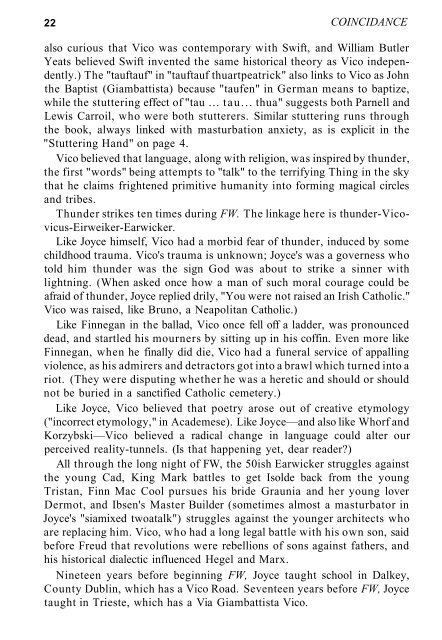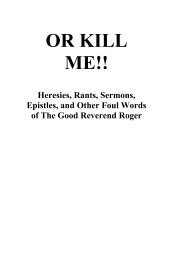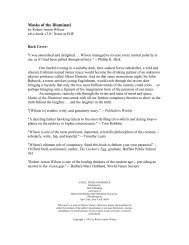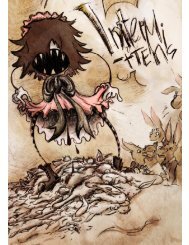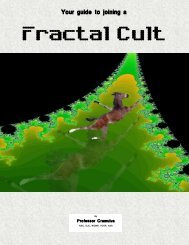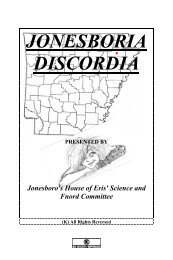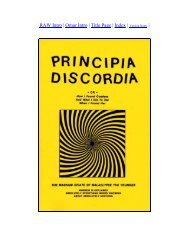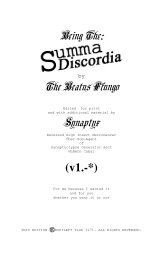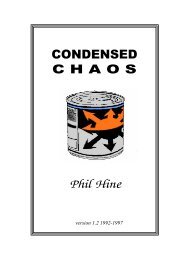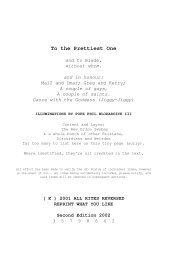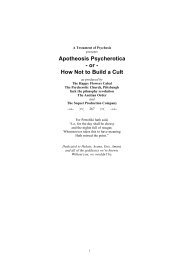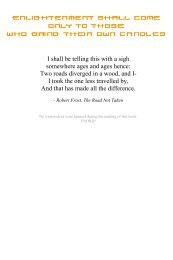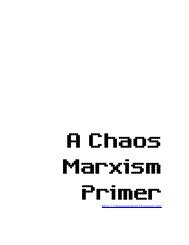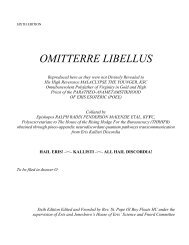Coincidance - Principia Discordia
Coincidance - Principia Discordia
Coincidance - Principia Discordia
Create successful ePaper yourself
Turn your PDF publications into a flip-book with our unique Google optimized e-Paper software.
22 COINCIDANCE<br />
also curious that Vico was contemporary with Swift, and William Butler<br />
Yeats believed Swift invented the same historical theory as Vico independently.)<br />
The "tauftauf" in "tauftauf thuartpeatrick" also links to Vico as John<br />
the Baptist (Giambattista) because "taufen" in German means to baptize,<br />
while the stuttering effect of "tau ... tau... thua" suggests both Parnell and<br />
Lewis Carroil, who were both stutterers. Similar stuttering runs through<br />
the book, always linked with masturbation anxiety, as is explicit in the<br />
"Stuttering Hand" on page 4.<br />
Vico believed that language, along with religion, was inspired by thunder,<br />
the first "words" being attempts to "talk" to the terrifying Thing in the sky<br />
that he claims frightened primitive humanity into forming magical circles<br />
and tribes.<br />
Thunder strikes ten times during FW. The linkage here is thunder-Vicovicus-Eirweiker-Earwicker.<br />
Like Joyce himself, Vico had a morbid fear of thunder, induced by some<br />
childhood trauma. Vico's trauma is unknown; Joyce's was a governess who<br />
told him thunder was the sign God was about to strike a sinner with<br />
lightning. (When asked once how a man of such moral courage could be<br />
afraid of thunder, Joyce replied drily, "You were not raised an Irish Catholic."<br />
Vico was raised, like Bruno, a Neapolitan Catholic.)<br />
Like Finnegan in the ballad, Vico once fell off a ladder, was pronounced<br />
dead, and startled his mourners by sitting up in his coffin. Even more like<br />
Finnegan, when he finally did die, Vico had a funeral service of appalling<br />
violence, as his admirers and detractors got into a brawl which turned into a<br />
riot. (They were disputing whether he was a heretic and should or should<br />
not be buried in a sanctified Catholic cemetery.)<br />
Like Joyce, Vico believed that poetry arose out of creative etymology<br />
("incorrect etymology," in Academese). Like Joyce—and also like Whorf and<br />
Korzybski—Vico believed a radical change in language could alter our<br />
perceived reality-tunnels. (Is that happening yet, dear reader?)<br />
All through the long night of FW, the 50ish Earwicker struggles against<br />
the young Cad, King Mark battles to get Isolde back from the young<br />
Tristan, Finn Mac Cool pursues his bride Graunia and her young lover<br />
Dermot, and Ibsen's Master Builder (sometimes almost a masturbator in<br />
Joyce's "siamixed twoatalk") struggles against the younger architects who<br />
are replacing him. Vico, who had a long legal battle with his own son, said<br />
before Freud that revolutions were rebellions of sons against fathers, and<br />
his historical dialectic influenced Hegel and Marx.<br />
Nineteen years before beginning FW, Joyce taught school in Dalkey,<br />
County Dublin, which has a Vico Road. Seventeen years before FW, Joyce<br />
taught in Trieste, which has a Via Giambattista Vico.


